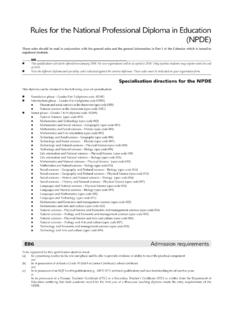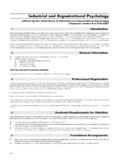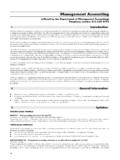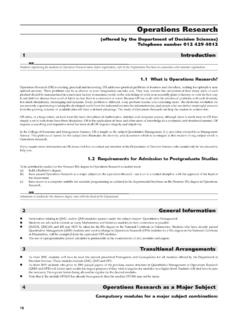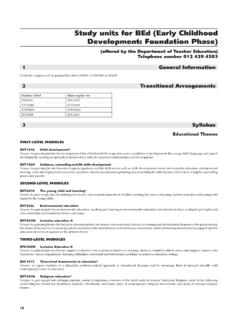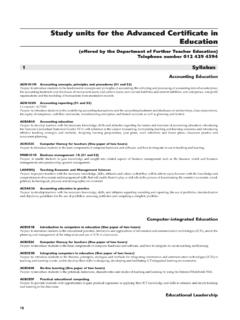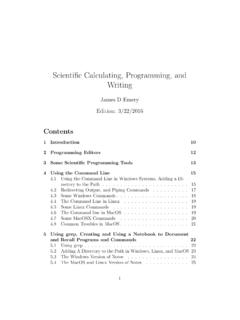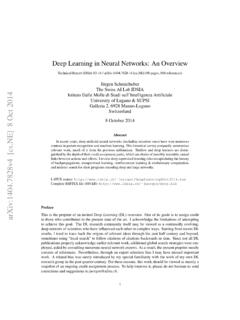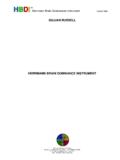Transcription of CB2 Syllabus2008 Q - University of South Africa
1 Quantitative Management (offered by the Department of Decision Sciences). Telephone number 012 429 4012. 1 Introduction What is Quantitative Management? Quantitative Management (also known as Operations Research) o ers a systematic and scientific approach to problem solving and decision making in complex environments and situations of uncertainty and conflict. The discipline is characterised by a search for an optimal (best) answer for a problem by using quantitative (numerical) models. The use of mathematical models enables a decision maker to better understand the problems facing him/her and provides a tool for making informed and reasoned judgements. Quantitative Management is a practical field.
2 It can be applied in many areas: manufacturing, businesses management, banking, environmental planning, mining, housing and engineering projects, management consultancy in fact, in every situation where numerical data are available and management or decision making takes place. The aim of the undergraduate programme in Quantitative Management is to give a student a substantive theoretical background in Quantitative Management, and at the same time to inculcate modelling skills and systematic thinking when solving decision making problems. At the conclusion of each year of the curriculum a student would be equipped with a variety of techniques and the skill of applying them to problems that arise in practice.
3 Quantitative Management is a multi-disciplinary subject that can be usefully combined with any other subject in this College. Requirements for admission to postgraduate studies To be admitted to studies for the Honours BCom degree in Quantitative Management a student must: (a) hold a BCom or BCompt degree or another approved degree in Economic and Management Science;. (b) have passed Quantitative Management as a major subject (or the equivalent thereof) see 4; or in a related discipline with the approval of the head of the department. (c) have access to a computer suitable for scientific programming as outlined in the departmental brochure on the Honours BCom degree in Quantitative Management.
4 NB. Admission to studies for the Honours degree must be approved by the Head of the Department. 2 General Information Students who have already passed Operations Research (OPS) modules and want to change to Quantitative Management (QMS) modules for a BCom degree with specialisation in Quantitative Management will be exempted from the equivalent QMS modules. Students who have already passed Operations Research (OPS) modules and want to change to Quantitative Management (QMG) modules for a general BCom degree will be exempted from the equivalent QMG modules. Students who have already passed Quantitative Management (QMS) modules for the BCom degree with specialisation in Quantitative Management and want to change to the general BCom degree will be exempted from the equivalent QMG modules.
5 3 Transitional Arrangements As from 2005, students will have to meet the current prescribed Prerequisite and Co-requisites for all modules o ered by the Department of Decision Sciences. These modules include QMG, QMS and OPS. As from 2005 students who prior to 2000 passed papers of the previous course structure in Quantitative Management or Operations Research (QMN and OPE) will forfeit such credits for degree purposes if they wish to register for modules on a higher level. Students will first have to pass the necessary Prerequisite before being allowed to register for the desired modules. Note that if the module QMG/QMS203 has already been passed, then the module QMG/QMS301 may not be taken. 4 Quantitative Management as a Major Subject For the BCom (General).
6 First level: QMG101, 102. Second level: QMG201, 202, 205. Third level: Any FIVE of QMG301, 302, 303, 304, 305, 306. For the BCom (with specialisation in Quantitative Management). First level: QMS101, 102. 12. Second level: QMS201, 202, 204, 205. Third level: Any FIVE of QMS301, 302, 303, 304, 305, 306. 5 Syllabus FIRST-LEVEL MODULES. FOR THE BCOM DEGREE IN GENERAL. QMG101P Quantitative modelling I (S1 and S2). Purpose: to introduce the student to basic mathematical modelling and computational skills for application in the business world. QMG102Q Introductory financial mathematics (S1 and S2). Purpose: to enable the student to derive and apply the fundamental formulae of financial mathematics. FOR THE BCOM DEGREE WITH SPECIALISATION IN QUANTITATIVE MANAGEMENT.
7 QMS101D Mathematical modelling I (S1 and S2). Prerequisite: (a) At least 50% in Mathematics HIGHER GRADE or (b) QMG101 or an equivalent examination in Mathematics Purpose: to equip the student with the mathematical skills necessary for other modules. The focus is on key aspects of pre-calculus, calculus and linear algebra. QMS102E Introductory financial mathematics (S1 and S2). Purpose: to enable the student to derive and apply the fundamental formulae of financial mathematics. FOR OTHER BCOM DEGREES WHERE RECOMMENDED. QMI101X Elementary quantitative methods (S1 and S2). Purpose: to introduce the student to elementary mathematical modelling, financial mathematics, elementary descriptive statistics and index numbers.
8 SECOND-LEVEL MODULES. FOR THE BCOM DEGREE IN GENERAL. QMG201S Mathematical programming (S1 and S2)*. Prerequisite: QMG101 or QMS101. Purpose: to enable the student to model and solve optimisation problems with techniques of di erential calculus, linear and nonlinear programming. QMG202T Rational decision-making (S1 and S2)*. Prerequisite: QMG101 or QMS101. Purpose: to introduce the student to basic statistics and to familiarise the student with the use of selected techniques from operations research, including decision analysis, project management and network modelling. QMG205W Financial modelling (S1 and S2). Prerequisite: QMG102 or QMS102. Purpose: to introduce the student to the essential approaches and concepts of financial management, analysis and decision-making.
9 FOR THE BCOM DEGREE WITH SPECIALISATION IN QUANTITATIVE MANAGEMENT. QMS201G Mathematical programming (S1 and S2)*. Prerequisite: QMS101. Purpose: to enable the student to model and solve optimisation problems with techniques of di erential calculus, linear and nonlinear programming. QMS202H Rational decision-making (S1 and S2)*. Prerequisite: QMS101. Co-requisite: STS111, 112. Purpose: to familiarise the student with the use of selected techniques from operations research, including decision analysis, project management, network modelling and Markov chains. QMS204K Mathematical modelling II (S1 and S2)*. Prerequisite: QMS101. Purpose: to provide the student with a wide-ranging overview of elementary mathematical modelling in the economic and financial environments.
10 QMS205L Financial modelling (S1 and S2). Prerequisite: QMS102. Purpose: to introduce the student to the essential approaches and concepts of financial management, analysis and decision-making. THIRD-LEVEL MODULES. 13. FOR THE BCOM DEGREE IN GENERAL. Prerequisite: QMG201, 202. QMG301V Production modelling (S1 and S2)*. Advice: Students who have passed QMG203 will receive exemption from QMG301 and must register for QMG205 if Quantitative Management is selected as a major subject. Purpose: to familiarise the student with a mathematical approach to operations management in a production environment. The emphasis is on mathematical management models for quality, inventory, capacity, material requirements and scheduling.
